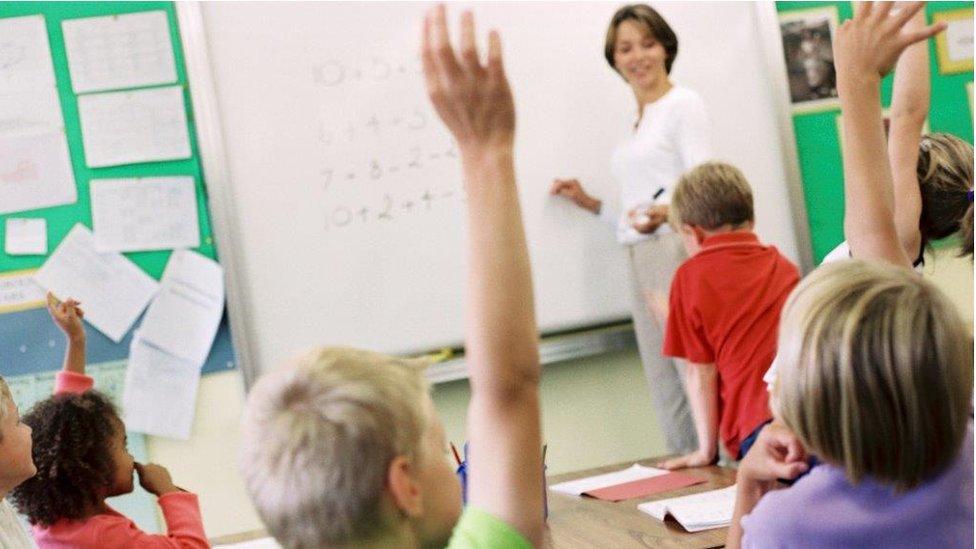Lack of sex education a ticking time bomb, councils warn
- Published

A lack of sex and relationships education (SRE) in some of England's secondary schools is creating a "ticking sexual health time bomb", councils say.
Sex education should be compulsory in all state secondary schools, the Local Government Association (LGA) believes.
It says pupils are not being prepared for adulthood and so are vulnerable to sexually transmitted infections.
Ministers say they are looking at how all pupils can have access to good SRE.
The LGA says age-appropriate SRE should be an essential part of the curriculum for all young people, stressing that parents should still have the choice to take their children out.
But without access to accurate information, pupils are not being adequately prepared for adulthood, the association warns.
It says official figures show there were 78,066 new diagnoses of sexually transmitted infections among 15 to 19-year-olds in England in 2015 and 141,060 among 20 to 24-year-olds.
Join the conversation - find us on Facebook, external
Local authorities, which have responsibility for public health, budget around £600m a year for sexual health, it added.

Young people's dissatisfaction with SRE
"A lot of us are turning 16 and it's legal to have intercourse, we need to be educated about signs of an abusive relationship emotionally." 15-year-old girl
"Sex was still regarded as a taboo subject and the teachers seemed uncomfortable talking about it. The whole concept was approached purely biologically with no regards to relationships at all and was pushed into a few lessons at the end of term alongside drugs education." 15-year-old boy
"I was sexually abused and no-one told me what was done to me was wrong. We got stranger danger and how to cross the road and that was it. He was my granddad. I didn't like it but didn't know it was wrong but thought I should be embarrassed as I thought it was my fault. If I had known it was wrong and that I could say something and someone had listened, it might have stopped earlier or I might have told before I did." 16-year-old girl
Source: Sex Education Forum

Sex education has been hotly debated in recent years with campaigners, as well as MPs, calling for more and better lessons for young people.
Currently, all secondary schools in England under local authority control have to teach SRE as part of the national curriculum.
But a loophole means academies and free schools - which are controlled by central government rather than local authorities - do not have to follow the national curriculum and are not, therefore, obliged to teach the subject.
In reality, most academies and free schools do provide SRE lessons, but the LGA says it wants to see universal rules "across the board".
Parents still have the right to withdraw their children from the lessons in all state schools in England.
'Sexual health time bomb'
Chair of the LGA's community wellbeing board Izzi Seccombe said the matter was a major health protection issue.
"The lack of compulsory sex and relationship education in academies and free schools is storing up problems for later on in life, creating a ticking sexual health time bomb, as we are seeing in those who have recently left school," Ms Seccombe said.
"The evidence suggests that when designed and delivered in the right way, SRE can have a really positive impact on a pupil's development."

Lisa Hallgarten from the Sex Education Forum said: "Children and young people have repeatedly told us that the SRE they receive under the current system is failing to prepare them adequately for adult life or to understand their bodies, sexual health or respectful relationships.
"The argument for compulsory SRE for all pupils in all schools has been won - the government must listen to the groundswell of support for SRE and make this a guaranteed part of the curriculum."
A spokesman for the Department for Education said: "High-quality education on sex and relationships is a vital part of preparing young people for success in adult life.
"It is compulsory in all maintained secondary schools and, as the education secretary said recently, we are looking at options to ensure all children have access to high-quality teaching in these subjects.
"We will update the House during the passage of the Children and Social Work Bill."
This Bill, which will set out new laws in relation to the welfare of children, is currently being debated by the House of Commons.
- Published27 January 2017

- Published6 December 2016
